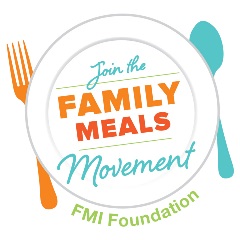ARLINGTON, VA – In conjunction with Mental Health Awareness Month, the FMI Foundation released its “Staying Strong  with Family Meals” Barometer summary with new data revealing that family meals bring joy and connectedness to tables across America. More than half of those surveyed believe that family meals are a good way to spend time with people and make them feel more connected. This Barometer study is a recurring quantitative study among a nationally representative sample of consumers.
with Family Meals” Barometer summary with new data revealing that family meals bring joy and connectedness to tables across America. More than half of those surveyed believe that family meals are a good way to spend time with people and make them feel more connected. This Barometer study is a recurring quantitative study among a nationally representative sample of consumers.
In addition, the study shows that family meals also help restore a sense of peace, with one-third of survey respondents saying family meals make them feel calm. Four in ten people believe family meals are relaxing and fun to eat, thereby enhancing quality of life.
“These new data underscore the thousands of studies the FMI Foundation has curated to substantiate further the expansive physical and mental health benefits of family meals,” said David Fikes, executive director of the FMI Foundation. “Sharing meals is clearly one of our best proactive practices to build a healthier nation. It is no wonder that 41% of those surveyed indicate they have been having more family meals at home over the past year and almost all, or 96%, expect they will continue to enjoy family meals in the future.”
Research suggests that youth mental health issues are reaching a tipping point in our society. The Centers for Disease Control’s 2021 Youth Behavior Risk Assessment indicates that 42% of high school students experienced persistent feelings of sadness or hopelessness that affect students’ abilities to participate in their daily activities in 2021, up from 28% in 2011.
Family meals have long been associated with improving mental health including reducing symptoms of depression, decreasing violent behavior, lessening thoughts of suicide among youth and have shown to be inversely related to disordered eating.[i] While mitigating the risks of destructive behaviors, increasing the frequency of family meals is also associated with boosting prosocial behavior and life satisfaction[ii] among adolescents. In short, family meals are a recipe for strengthening emotional well-being among children and adolescents.
Family meals are also good for parents’ mental health. A paper published in 2018 examined whether parents who share meals with their families report the same indicators of well-being. These findings suggested that parents report frequent family meals are associated with higher levels of family functioning, greater self-esteem, and lower levels of depressive symptoms and stress.[iii]
“Family meals are a proven way to strengthen the emotional well-being of children and adults and bolster the bond they share as a family,” Fikes continued. “With youth depression and anxiety at an all-time high, there has never been a better time to take simple steps, like family meals, to build healthier minds and bodies.”
National Family Meals Month™, celebrated each September, has generated such a following that it is now known as the Family Meals Movement. Embraced year round, the movement raises awareness for the many benefits of family meals as supported by thousands of peer-reviewed research studies.
About the FMI Foundation
Established in 1996, the FMI Foundation seeks to ensure continued quality and efficiency in the food retailing system and is operated for charitable, educational, and scientific purposes. To help support the role of food retailing, the FMI Foundation focuses on research, education, and resources in the area of health and well-being, which embraces food safety, nutrition and social responsibility concerns. For information regarding the FMI foundation, visit www.fmifoundation.org. #familymealsmonth; #familymealsmovement.
--------
[i] Harrison, Megan E. et al. "Systematic review of the effects of family meal frequency on psychosocial outcomes in youth." Canadian Family Physician, 2015.
[ii] Elgar, Frank J. et al. "Family dinners, communication, and mental health in Canadian adolescents." Journal of Adolescent Health, 2013.
[iii] Utter, Jennifer et al., "Family meals among parents: Associations with nutritional, social and emotional wellbeing." Preventive Medicine, 2018.
 Industry Topics address your specific area of expertise with resources, reports, events and more.
Industry Topics address your specific area of expertise with resources, reports, events and more.
 Our Research covers consumer behavior and retail operation benchmarks so you can make informed business decisions.
Our Research covers consumer behavior and retail operation benchmarks so you can make informed business decisions.
 Events and Education including online and in-person help you advance your food retail career.
Events and Education including online and in-person help you advance your food retail career.
 Food Safety training, resources and guidance that help you create a company food safety culture.
Food Safety training, resources and guidance that help you create a company food safety culture.
 Government Affairs work — federal and state — on the latest food industry policy, regulatory and legislative issues.
Government Affairs work — federal and state — on the latest food industry policy, regulatory and legislative issues.
 Get Involved. From industry awards to newsletters and committees, these resources help you take advantage of your membership.
Get Involved. From industry awards to newsletters and committees, these resources help you take advantage of your membership.
 Best practices, guidance documents, infographics, signage and more for the food industry on the COVID-19 pandemic.
Best practices, guidance documents, infographics, signage and more for the food industry on the COVID-19 pandemic.
